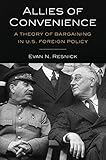Allies of Convenience : A Theory of Bargaining in U.S. Foreign Policy / Evan N. Resnick.
Material type: TextPublisher: New York, NY : Columbia University Press, [2019]Copyright date: ©2019Description: 1 online resource : 5 illustrationsContent type:
TextPublisher: New York, NY : Columbia University Press, [2019]Copyright date: ©2019Description: 1 online resource : 5 illustrationsContent type: - 9780231190589
- 9780231549028
- China-Foreign relations-United States
- Great Britain-Foreign relations-United States
- Iraq-Foreign relations-United States
- Pakistan-Foreign relations-United States
- United States-Foreign relations-1945-1989
- United States-Foreign relations-China
- United States-Foreign relations-Great Britain
- United States-Foreign relations-Iraq
- United States-Foreign relations-Pakistan
- POLITICAL SCIENCE / International Relations / Diplomacy
- 327.73 23
- E840 .R42 2019
- online - DeGruyter
- Issued also in print.
| Item type | Current library | Call number | URL | Status | Notes | Barcode | |
|---|---|---|---|---|---|---|---|
 eBook
eBook
|
Biblioteca "Angelicum" Pont. Univ. S.Tommaso d'Aquino Nuvola online | online - DeGruyter (Browse shelf(Opens below)) | Online access | Not for loan (Accesso limitato) | Accesso per gli utenti autorizzati / Access for authorized users | (dgr)9780231549028 |
Browsing Biblioteca "Angelicum" Pont. Univ. S.Tommaso d'Aquino shelves, Shelving location: Nuvola online Close shelf browser (Hides shelf browser)

|

|

|

|

|

|

|
||
| online - DeGruyter Dying for Rights : Putting North Korea's Human Rights Abuses on the Record / | online - DeGruyter The Unworthy Scholar from Pingjiang : Republican-Era Martial Arts Fiction / | online - DeGruyter The Habermas-Rawls Debate / | online - DeGruyter Allies of Convenience : A Theory of Bargaining in U.S. Foreign Policy / | online - DeGruyter The Nose and Other Stories / | online - DeGruyter Getting Price Right : The Behavioral Economics of Profitable Pricing / | online - DeGruyter Japan's New Regional Reality : Geoeconomic Strategy in the Asia-Pacific / |
Frontmatter -- Contents -- Acknowledgments -- Introduction. Alliances Of Convenience In International Politics And U.S. Foreign Policy -- 1. Contending Theories Of U.S. Bargaining With Allies Of Convenience -- 2. The U.S. Alliance With The People'S Republic Of China, 1971- 1989 -- 3. The U.S. Alliance With Pakistan, 1981- 1988 -- 4. The U.S. Alliance With Iraq, 1982- 1988 -- 5. The U.S. "Special Relationship" Alliance With The United Kingdom, 1950- 1953 -- Conclusion -- Notes -- Index
restricted access online access with authorization star
http://purl.org/coar/access_right/c_16ec
Since its founding, the United States has allied with unsavory dictatorships to thwart even more urgent security threats. How well has the United States managed such alliances, and what have been their consequences for its national security? In this book, Evan Resnick examines the negotiating tables between the United States and its allies of convenience since World War II and sets forth a novel theory of alliance bargaining.Resnick's neoclassical realist theory explains why U.S. leaders negotiate less effectively with unfriendly autocratic states than with friendly liberal ones. Since policy makers struggle to mobilize domestic support for controversial alliances, they seek to cast those allies in the most benign possible light. Yet this strategy has the perverse result of weakening leverage in intra-alliance disputes. Resnick tests his theory on America's Cold War era alliances with China, Pakistan, and Iraq. In all three cases, otherwise hardline presidents bargained anemically on such pivotal issues as China's sales of ballistic missiles, Pakistan's development of nuclear weapons, and Iraq's sponsorship of international terrorism. In contrast, U.S. leaders are more inclined to bargain aggressively with democratic allies who do not provoke domestic opposition, as occurred with the United Kingdom during the Korean War. An innovative work on a crucial and timely international relations topic, Allies of Convenience explains why the United States has mismanaged these "deals with the devil"-with deadly consequences.
Issued also in print.
Mode of access: Internet via World Wide Web.
In English.
Description based on online resource; title from PDF title page (publisher's Web site, viewed 02. Mrz 2022)


